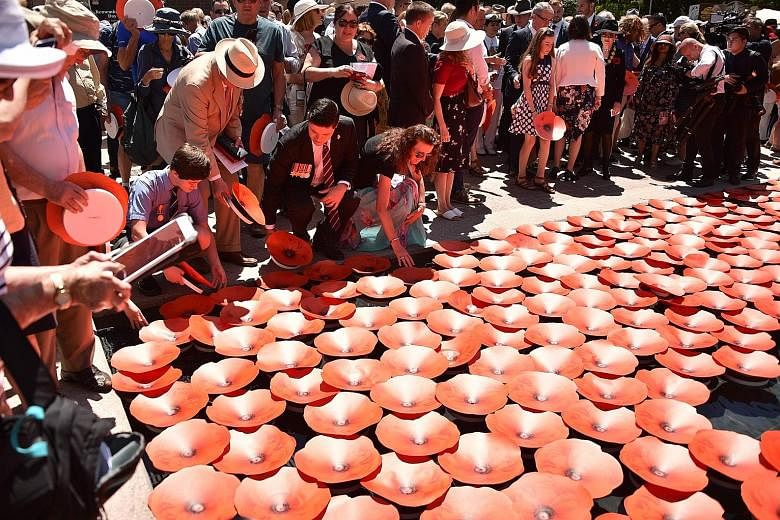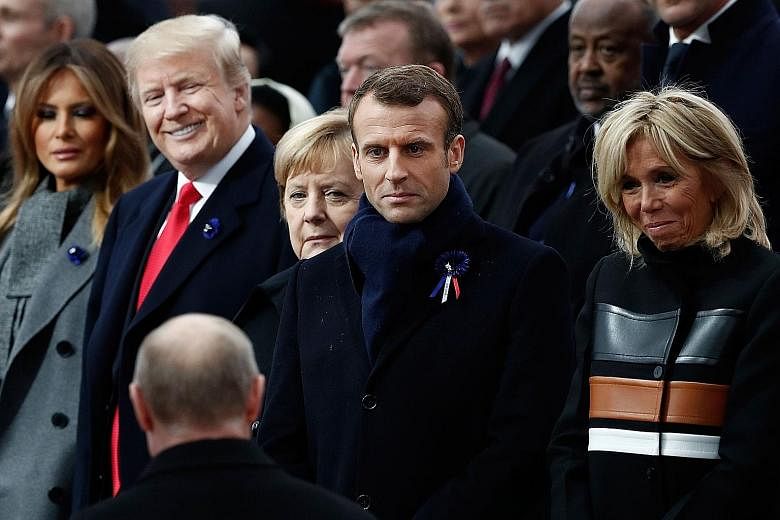PARIS • Some 70 world leaders gathered under rainy skies at the Arc de Triomphe in Paris yesterday for a solemn ceremony to mark the 100th anniversary of the end of World War I.
US President Donald Trump, Russia President Vladimir Putin, German Chancellor Angela Merkel and dozens of monarchs, presidents and prime ministers from Europe, Africa, the Middle East and beyond joined French President Emmanuel Macron to mark the moment guns fell silent across Europe a century ago.
The commemoration is the centrepiece of global tributes to honour the 10 million soldiers who were killed during the 1914-18 war and the moment the Armistice, signed in north-eastern France, came into effect at 11am on Nov 11, 1918.
As Mr Trump's convoy was making its way up the Champs Elysees, a bare-breasted protester from the Femen radical feminist group ran towards his motorcade, coming within a few metres, before being apprehended by police.
In a glass canopy at the foot of the triumphal arch, built by Emperor Napoleon in 1806, the leaders stood for the solemn ceremony.
The last to arrive was Russia's Putin, who shook hands with Mr Macron, Dr Merkel and then Mr Trump, briefly giving the US leader a thumbs up.
Mr Macron stood to attention as a military band played the Marseillaise, the French national anthem, before walking through the rain to inspect troops. In a speech, he urged leaders to come together for a joint "fight for peace". "Let us build our hopes rather than playing our fears against each other," he said.
In a rare public display of emotion by the leaders of two world powers, Mr Macron and Dr Merkel held hands last Saturday during a poignant ceremony in the Compiegne Forest, north of Paris, where French and German delegations signed the Armistice.
The conflict was one of the bloodiest in history, reshaping Europe's politics and demographics. Peace, however, was short-lived and two decades later, Nazi Germany invaded its neighbours.
Yesterday afternoon, Mr Macron hosted the inaugural Paris Peace Forum, which seeks to promote a multilateral approach to security and governance and ultimately, avoid the errors that led to the outbreak of World War I.
Dr Merkel said the forum showed that "today there is a will, and I say this on behalf of Germany with full conviction, to do everything to bring a more peaceful order to the world, even though we know we still have much work to do".
In London, Prince Charles led the nation in remembering those who gave their lives in the war as he laid the wreath at the Cenotaph.
For the first time ever, he was joined by German President Frank-Walter Steinmeier, marking a historic act of reconciliation between the two nations.
India, Australia and New Zealand also paused to remember their countrymen who died fighting on the other side of the world.
The leaders of these Commonwealth nations sounded a message of peace and hope for the world in the new century.
"This was a war in which India was not directly involved yet our soldiers fought world over, just for the cause of peace," said Indian Prime Minister Narendra Modi on Twitter yesterday.
The centenary comes as India, then a British colony, seeks greater recognition of its contribution of 1.3 million troops to the allied war effort - and the 74,000 who never came home.
In Canberra, Prime Minister Scott Morrison spoke of the ultimate sacrifice made by Australians in places like Fromelles in northern France.
"For our tomorrows, they gave their today. In silence, we commit ourselves to standing by those who have returned home," he told thousands gathered at the national Remembrance Day ceremony.
Of the more than 400,000 of the young Australian federation's citizens who enlisted, more than 300,000 served overseas and almost 62,000 died in the trenches.
The New Zealand commemoration followed two minutes of silence at 11am. There was a 100-gun salute on the Wellington waterfront, while nationally, people cheered, church bells rang, emergency services sounded their sirens and ship and car horns blared.
More than 100,000 New Zealanders - about 10 per cent of the population at the time - served overseas during the war, and 18,300 were killed.
REUTERS, AGENCE FRANCE-PRESSE
SEE OPINION, HOME:
Today's armies are still fighting World War I
Remembrance Day marked in Singapore to mark a century since World War I ended
WORLD WAR I BY THE NUMBERS
A lack of reliable statistics makes the figures difficult to pin down, accounting for sometimes substantial variations between historians. Here are the most widely accepted figures from the Great War.
>70
NUMBER OF NATIONS DRAWN INTO THE CONFLICT
A dozen independent nations went to war at its start in 1914, with the rest entering later, for example, Italy in 1915 and the United States in 1917.
70m
NUMBER OF TROOPS MOBILISED
About 20 million men were mobilised by the warring parties at the outset, with the number rising to around 70 million as the war dragged on and expanded.
10m
NUMBER OF SOLDIERS KILLED
Germany and Russia suffered the highest numbers of casualties. The opening weeks of the war exacted the heaviest human toll. About 27,000 French soldiers were killed in a single day on Aug 22, 1914, the deadliest day in the history of the French army.
5m-10m
NUMBER OF CIVILIANS DEAD
The toll generally includes those killed in the actual fighting, as well as from the forced displacements of populations, famine and the subsequent civil conflicts in Russia, eastern Europe and Turkey.
70%
PERCENTAGE OF DEATHS CAUSED BY ARTILLERY FIRE
Artillery fire was the greatest killer in the war, after which between five million and six million men were left mutilated for life.
10b
NUMBER OF LETTERS AND PACKAGES
Fighters on the front and their loved ones back home exchanged a huge volume of correspondence during the 1914-1918 conflict.
AGENCE FRANCE-PRESSE


